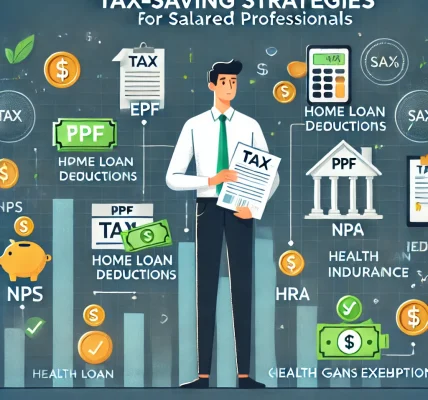Tax planning is a critical yet often overlooked aspect of wealth management. While investment strategies, asset allocation, and retirement planning typically dominate wealth management discussions, tax efficiency is just as important in helping individuals accumulate, preserve, and grow their wealth over time.
In this blog, we’ll explore the significant role that tax planning plays in wealth management, how it can enhance your financial strategy, and key tax planning strategies that can help optimize your returns and minimize tax liabilities.
1. What Is Tax Planning?
Tax planning refers to the process of analyzing your financial situation and designing strategies to reduce your tax burden. This involves taking steps to optimize your income, deductions, exemptions, and credits to ensure you pay the minimum amount of taxes required by law.
Proper tax planning allows you to:
- Maximize your savings and investments by reducing taxable income.
- Leverage tax-saving instruments and deductions available under the law.
- Minimize tax liabilities on your income, capital gains, and other financial gains.
- Improve overall financial planning by aligning tax strategy with investment goals.
When combined with comprehensive wealth management, tax planning can have a direct impact on your financial well-being and the success of your wealth-building journey.
2. Why Is Tax Planning Crucial in Wealth Management?
Wealth management is not just about making wise investments; it’s about managing and growing your wealth efficiently. Here’s why tax planning is essential for effective wealth management:
Maximizing Investment Returns
One of the most significant advantages of tax planning is its ability to maximize the returns on your investments. Taxes can eat into your investment returns, but strategic tax planning ensures that you’re not unnecessarily losing a portion of your earnings to taxes. By utilizing tax-efficient investment vehicles, like tax-free bonds or tax-advantaged retirement accounts, you can keep more of your earnings.
Preserving Wealth Across Generations
Tax planning can also play a role in wealth preservation. By considering how taxes will impact your estate, you can design strategies to pass on your wealth in a tax-efficient manner. Wealthy families often use trusts, gifting strategies, and other estate planning tools to reduce estate taxes and ensure that more of their wealth is passed down to future generations.
Retirement Planning
Effective retirement planning goes hand-in-hand with tax planning. Certain retirement accounts, such as 401(k)s or IRAs in the U.S., provide tax advantages that allow your wealth to grow tax-deferred. Similarly, tax-free accounts like Roth IRAs can provide tax-free income in retirement. Tax planning helps you choose the right retirement strategy based on your financial goals, ensuring that you have a sufficient nest egg when it’s time to retire.
Minimizing Taxes on Capital Gains
When you invest in assets like stocks, real estate, or mutual funds, you may generate capital gains. While taxes on capital gains can be high, strategic tax planning can help minimize these taxes by using methods such as tax loss harvesting, investing in tax-deferred accounts, or holding onto investments for the long term to benefit from favorable long-term capital gains tax rates.
Reducing Taxable Income
By strategically investing in tax-advantaged accounts, contributing to retirement savings, and utilizing tax deductions like those for home loans or educational expenses, you can reduce your taxable income. This not only lowers your tax liability but also puts more money back into your wealth-building strategy.
3. Key Tax Planning Strategies in Wealth Management
To leverage tax planning effectively in wealth management, it’s important to understand the various tax-saving strategies available. Below are some common tax planning strategies to optimize your financial situation:
1. Tax-Advantaged Investment Accounts
Investing through tax-advantaged accounts like 401(k)s, IRAs, or Roth IRAs is one of the best ways to reduce your taxable income and grow your wealth tax-deferred or tax-free. These accounts offer significant tax benefits, such as:
- Tax-deferred growth: Your investments grow without being taxed until withdrawal (traditional 401(k), traditional IRA).
- Tax-free growth: Withdrawals in retirement are tax-free if you meet the requirements (Roth IRA).
These accounts not only help you save for retirement but also reduce your taxable income today.
2. Tax Loss Harvesting
Tax loss harvesting involves selling investments that have declined in value to offset gains from other investments. This strategy can reduce your taxable income and help you save money on capital gains taxes. It’s a powerful tool to keep more of your investment returns in your pocket.
3. Diversification Across Taxable and Tax-Advantaged Accounts
A well-diversified portfolio includes investments across taxable accounts, tax-deferred accounts, and tax-free accounts. This strategy allows you to take advantage of various tax benefits and minimize tax liabilities.
- Taxable accounts: Be mindful of how your investments in these accounts will be taxed, especially dividends and capital gains.
- Tax-deferred accounts: Take advantage of tax-deferred growth to maximize your savings for retirement.
- Tax-free accounts: Use tax-free growth accounts like Roth IRAs or municipal bonds to ensure you have tax-free income in retirement.
4. Charitable Contributions
If you’re looking to reduce your tax burden while giving back to the community, charitable donations can be a tax-efficient strategy. Contributions to eligible charities are tax-deductible, and you can use this strategy to reduce your taxable income.
Additionally, using tax-efficient ways to donate, such as donating appreciated assets like stocks or real estate, can provide extra tax savings while supporting your favorite causes.
5. Estate Planning and Trusts
Tax planning doesn’t just involve reducing your tax bill today; it also involves ensuring that your wealth is passed down efficiently to your heirs. Estate planning strategies like establishing trusts or gifting assets to loved ones can help minimize estate taxes and ensure that your wealth is distributed according to your wishes.
4. The Bottom Line: Tax Planning Is a Key Component of Wealth Management
Tax planning is an essential element of wealth management that should not be ignored. By integrating tax-efficient strategies into your financial plan, you can maximize your returns, minimize taxes, and build a foundation for long-term wealth.
Whether you’re looking to save for retirement, preserve wealth for future generations, or simply reduce your current tax liability, tax planning will help you achieve your financial goals with greater ease and efficiency.
Remember, tax laws and regulations frequently change, so it’s important to stay updated or work with a qualified financial advisor or tax professional to ensure that you’re using the best strategies available for your specific situation.




